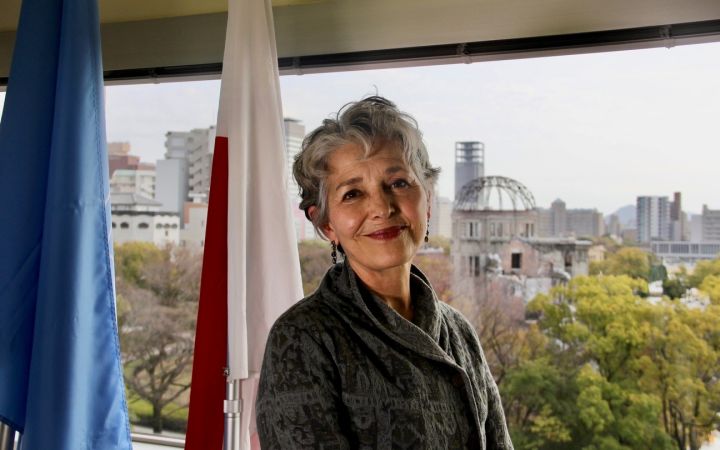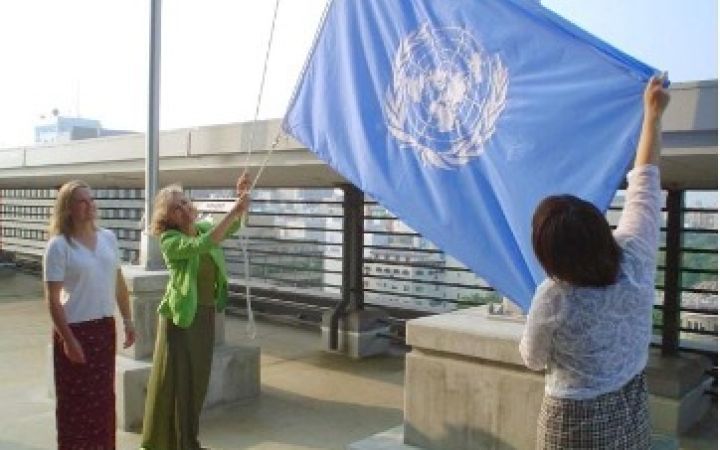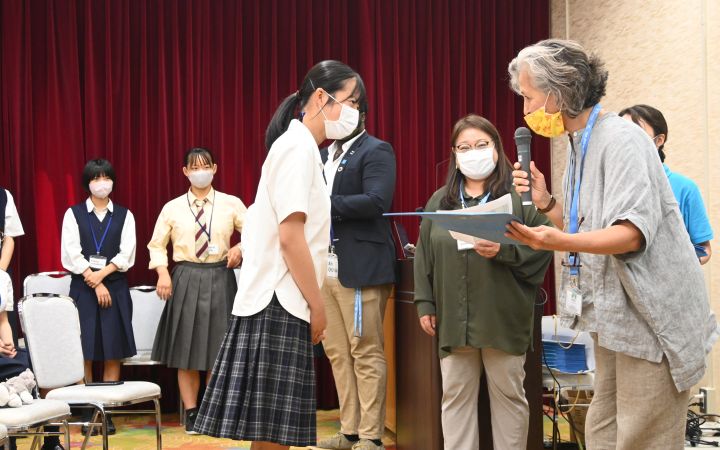- Dr Nassrine Azimi is a founding director of the UNITAR Hiroshima Office
- While Dr. Azimi was Chief of the UNITAR New York, she was approached by a Japanese academic with an idea to establish an office in Hiroshima. With the support of Hiroshima Prefecture, it was realized and she became the first director there.
- Since then, UNITAR has been bringing learners from developing countries to the heart of the city, next to the Atomic Bomb Dome and the Peace Memorial Park in Hiroshima.
- Looking to the next 20 years, Dr. Azimi hopes that UNITAR will help rebuild that missing link between economic prosperity and ethics, knowledge, and humanity. UNITAR has a powerful advantage and ally in Hiroshima.
26 October 2023, Hiroshima- Early one summer morning in 2003, Dr. Nassrine Azimi went up to the rooftop of the Hiroshima Chamber of Commerce and Industry building with a colleague and the building security guard. It was opening day for the new UNITAR Hiroshima Office and they were there at dawn to hoist the UN flag.
As they looked over to the neighbouring Peace Park, the guard said, “This is where my mother and my grandmother are sleeping.”
It took Nassrine a moment to understand: he meant they had died in the atomic bombing.
From then on, this became sacred ground for me. I realized, oh my goodness, the Peace Park is really special. And the Peace Park has continued to be something special for all of us, and indeed for UNITAR’s training programmes. It has instilled a kind of gravity, both caution and hope.” - Nassrine Azimi, Founding Director, UNITAR Hiroshima Office
LESSONS FROM HIROSHIMA: TURNING SUFFERING TO RECONSTRUCTION
The idea to establish an office in Hiroshima came from a Japanese academic, who approached Nassrine while she was Chief of the UNITAR New York. With the support of Hiroshima Prefecture, the idea became reality and Nassrine became the Hiroshima Office’s first director.
Since then, UNITAR has been bringing learners from developing countries to the heart of the city, next to the Atomic Bomb Dome and the Peace Memorial Park. Hiroshima’s story of rebirth offers those learners – many of whom are from conflict or post-conflict countries – lessons and inspiration.
We tried to figure out how the symbolism of Hiroshima could affect [our] programmes and what kind of training programmes could benefit the most from what Hiroshima represented”
Symbols of hope and reconstruction are everywhere in the city, whether it’s the tram system, the local dish okonomiyaki (a pancake that could contain meat, vegetables, noodles, and anything else), or even baseball – all of which emerged in the darkest moments of the city’s history and gave hope to the people of Hiroshima. “I almost don’t understand baseball”, admits Nassrine, “but it deeply moves me, this love that people have for [their team] Carp so I am a fan!”
Hiroshima offers the simple but remarkable idea of turning one’s suffering into something “more universal”, in Nassrine’s words. It offers all those stuck in a vicious cycle of anger and violence an alternative, a path to peace and prosperity.
Bringing BACK ETHICS, COMPASSION AND HUMANITY INTO DEVELOPMENT
In the past two decades, Nassrine has seen ethical and philosophical breakdowns on an international scale – breakdowns accelerated by the merciless economic pressures of globalization and accompanied by rapid developments in science and technology.
“But science without ethics, science without compassion, science without humanity is very dangerous in our hands”, she says. “Hiroshima and Nagasaki stand as testimony to that.”
Looking to the next 20 years, Nassrine hopes that UNITAR will help rebuild that missing link between economic prosperity and ethics, knowledge, and humanity. UNITAR has a powerful advantage and ally in Hiroshima.
You know, people write to me after 15 years, 20 years, saying, oh, it was the most important week of my life [to come to Hiroshima]. I get it. When you visit Hiroshima, other things become a little bit trivial. You tend to want to see the bigger picture, the meaning of what is worth doing. It’s about war and peace, reconciliation, forgiveness, not forgetting. So many things, thanks to this place.”
ABOUT UNITAR
The United Nations Institute for Training and Research (UNITAR) is a dedicated training arm of the United Nations. In 2022, UNITAR trained over 395,000 learners around the world to support their actions for a better future. In addition to our headquarters in Geneva, we have offices in Hiroshima, New York and Bonn and networks around the world.
The Division for Prosperity is based in the Hiroshima Office and Geneva. We seek to shape an inclusive, sustainable and prosperous world through world-class learning and knowledge-sharing services on entrepreneurship, leadership, finance and trade, digital technologies, and nuclear disarmament and non-proliferation. We empower individuals from least-developed countries, countries emerging from conflict, and small-island developing states – especially women and young people – to bring about positive change.




